Story and Photos by Payton Cordova
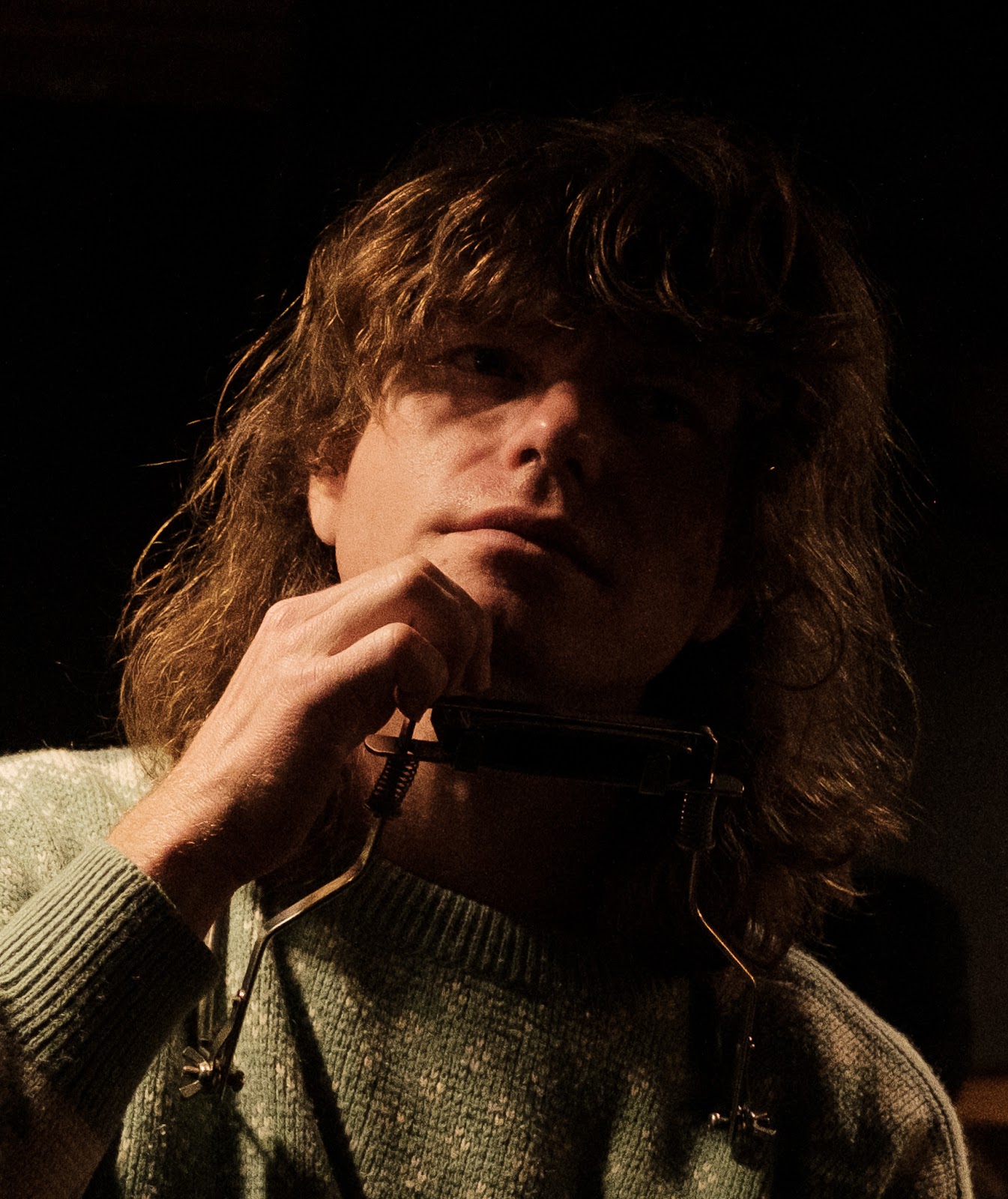
Jesse Welles fields song requests at the Fox Theater in Boulder, Co., Sunday, Apr. 6, 2025. (Radio 1190/Payton Cordova)
Sometimes the whistling is the only thing he keeps to himself.
When people go to a Jesse Welles concert these days, they go to sing his songs. The 30-year-old musician has been rallying supporters through the psychic punch of short form videos on TikTok, Instagram, and Youtube with a charismatic honesty. Jaunty tunes jesting corrupt healthcare, low wages and nifty bugs give way to sincere lyricism sharing Welles’ own internal wrestling. While the Arkansan folk troubadour toured the Colorado stretch of his “Fear is the Mind Killer” tour, he released a new song recorded in his Denver hotel room and rotated in multiple new songs to his already extensive set list of tunes written almost entirely in the last year.
As a performer, Welles started sharing his music online in 2012. At the time, he was posting in the “r/Grunge” subreddit with original songs reminiscent of a garage rock Kurt Cobain. In a February interview with David Peisner of The New York Times, Welles stated that he developed an affinity with Cobain after hearing him as a kid.
“I’m listening, going, ‘I could do something like that.’ I can’t do Robert Plant, but maybe I could do Cobain,” he told Peisner.
By 2018, Welles had released his first studio album “Red Trees and White Trashes” and was touring with his third band, opening for Greta Van Fleet and playing the local radio circuit. New York-based label 300 Entertainment threw some money into the ring, betting that Welles’ psychedelic grunge sound could earn a buck from a music scene with the reflexes of a dead snake. In the days and months after, the well dried up and COVID hit, sending Welles back to Arkansas where he did his best to quit music.
Today, the singer-songwriter’s ink well has found a new catalyst after a brush with mortality, leading him to write and release 105 original songs in the span of a year direct to YouTube. For this he has earned the John Prine Songwriter Fellowship, play time at Farm Aid and an appearance at the upcoming 2025 Newport Folk Festival. Social media decrees him Bob Dylan’s heir apparent; a solitary man come to voice the great American struggle of the 2020s.
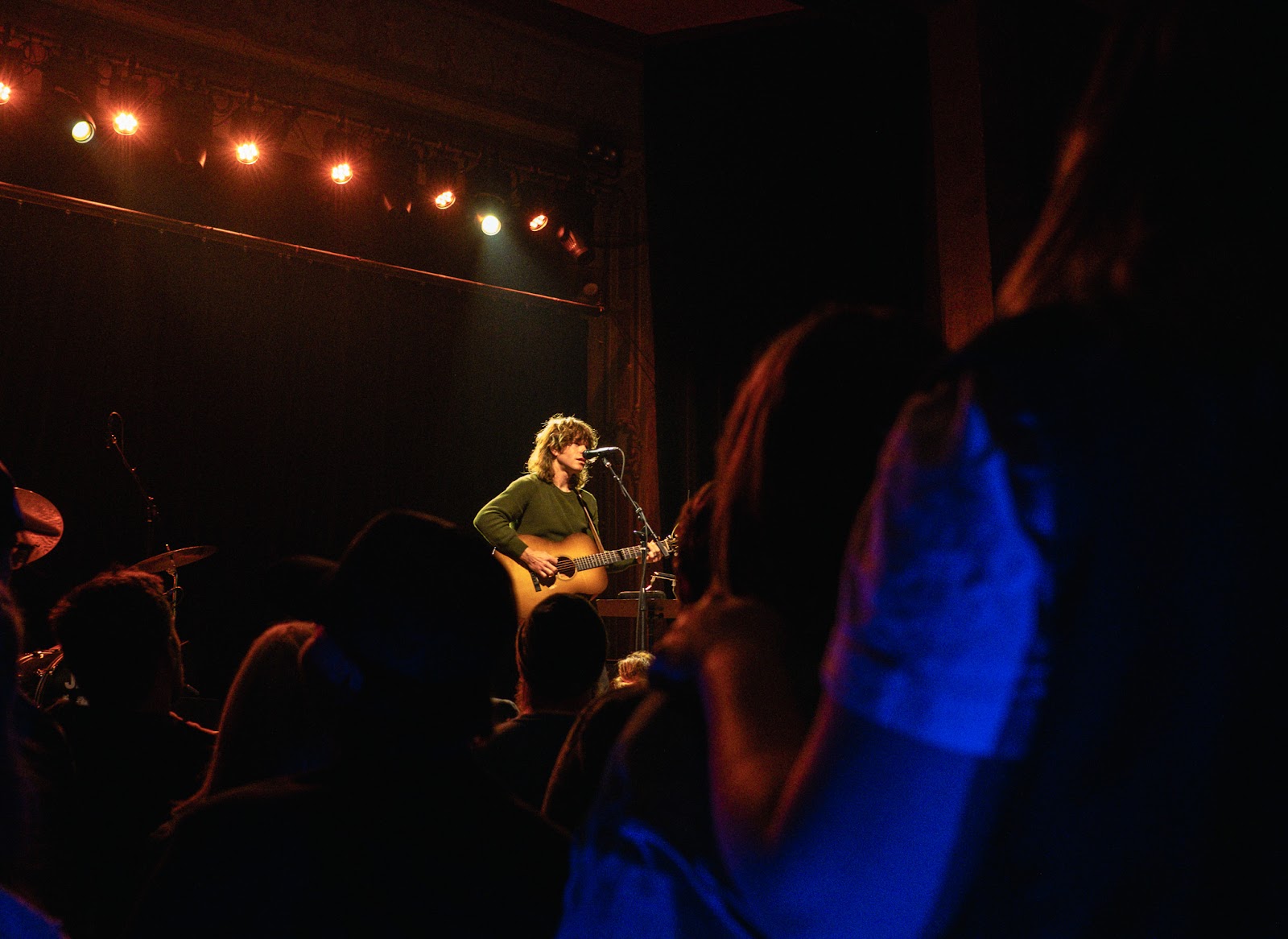
Jesse Welles opens his set at the Bluebird Theater in Denver, Co., Friday, Apr. 4, 2025. (Radio 1190/Payton Cordova)
Friday Night
Outside Colfax’s Bluebird Theater, an older couple was swaying into each other’s hips, dodging raindrops from the roof above them. It was a gloomy day. “Ok, what is Jesse Welles?” said the woman. “Now what’s the question?” asked the man. “Question: Who’s the best songwriter of his generation?” They passed the time talking about smoking weed in their younger days with the surrounding teens.
Once inside, I found a standing spot against the right corner of the stage. One fan to my right said they were first introduced to “Jesse’s music” through his song “Fat.” “It was the first time I heard someone say it wasn’t my fault,” they said. “I really hope he plays it.” Welles stepped onto the stage to a buzzing audience, placing his harmonica holder over his head and introducing himself with a measured smile as he began to sing. “Well, it’s your own damn fault you’re so damn fat—It’s just like when your grandpappy’s lungs turned black—That was his fault too—The doctor told him what to do—He smoked Camels, guess he bought the wrong pack.”
I looked to my right with a smile and saw the fan’s eyes beam with recognition. To an audience that hasn’t heard their voice reflected for a long time, Welles’ music greets you like an old friend remembering times you’ve often convinced yourself you were alone. Through this he has built a deeply caring and personal relationship with his fans. But when people come to think that one person’s voice speaks for their plight, a peculiar fear of betrayal inches closer. Like any cult figure, Welles’ legitimacy depends on his perceived authenticity. As he becomes humanized through extended life in the public eye, the contradictions of his character may become revulsive to those who, at present, adore him like a new American prophet. It’s dangerous territory to be a populist. Welles walks the line with a grin.

A young audience member watches Jesse Welles perform at the Fox Theater in Boulder, Co., Sunday, Apr. 6, 2025. (Radio 1190/Payton Cordova)
After bringing “the fellas” onstage –drummer Connor Streeter and bassist Joel Parks–Welles played the opening chords to “Heart Shaped Box.” A couple beside me gasped, while others shouted in recognition. Born the year Cobain died, Welles’ stage-shy presence melts away when singing, forging a connection between the two artists that crystallized during his channeling of the classic in the Bluebird. Leaning into the growl of his earlier rock era, Welles gave the song a harmonica solo before screaming back into the chorus.
In the American tradition, musicians looking for an entrance into economic success find paths through genres originated by hard times – the blues, rock, rap. Elvis may be the poster child of a musician taboo enough to garner rabid fans and white enough to sign major contracts, but the same function is repeated today by artists like Post Malone. Suffering reaps profit, but this old story must be considered carefully. Commerce propels the success of palatable revolutionaries. As they are asked to take on the voice of those without, these artists accused of figure-heading radical art write and perform in conversation with the original creators. Cobain famously called Leadbelly his favorite musician.
Welles is an American artist, wearing a band of influences on his sleeve, but it is his unusual commitment to testing himself through his writing that has given him a gift beyond the commercially raw voice of his earlier career. His work whittles questions of those who hate and those who are hated into a fine toothed comb, dragged through the American conscience.
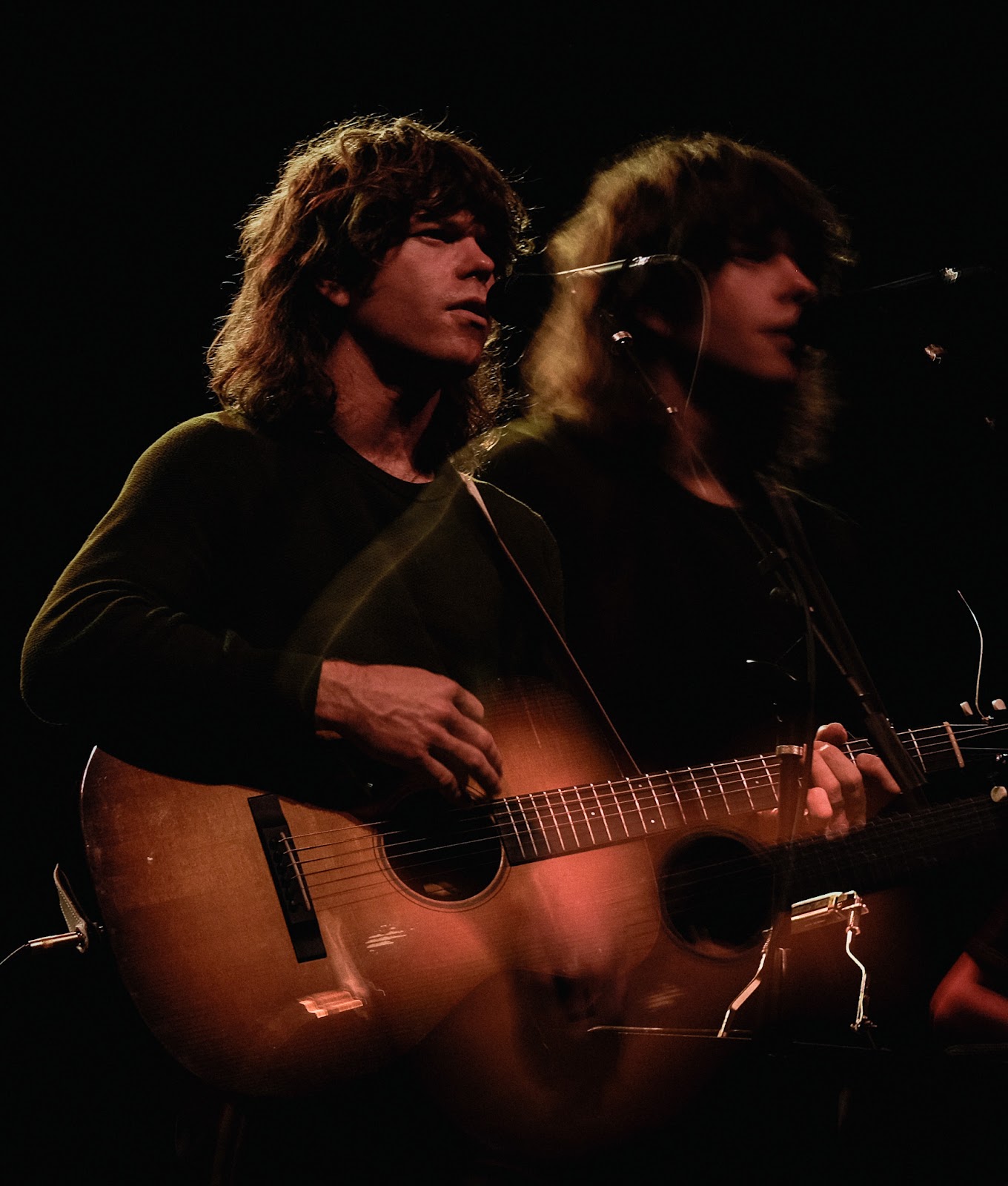
Jesse Welles performs at the Bluebird Theater in Denver, Co., Sunday, Apr. 4, 2025. (Radio 1190/Payton Cordova)
Saturday Night
The next night, I was guided by a staff of pimpled ushers to a seated crowd. I greeted a few fans I recognized from the show the night before. Together, we sat in spitting distance from where Welles would soon stand. As he walked onto the Fort Collins stage, he scanned the room in silence. The venue, an armory built for the National Guard with a shooting gallery in the basement, felt more attuned to a wrinkled preacher and a closed casket than a six-string picker. Welles’ eyes shifted with a slow restlessness through the audience. “You know…you don’t have to stay in them.” The audience offered scattered smiles while a few braves took to standing in the aisles. The singer strummed along to his opening tunes, “Fat” and “Slaves,” while watching staff ask audience members to go back to their seats. “I see everyone’s got to stay in their places,” the musician quipped. “That’s ok…I’ll stay in mine too.” He rushed through the rest of his solo music, then welcomed Streeter and Parks onstage with a tired neck.
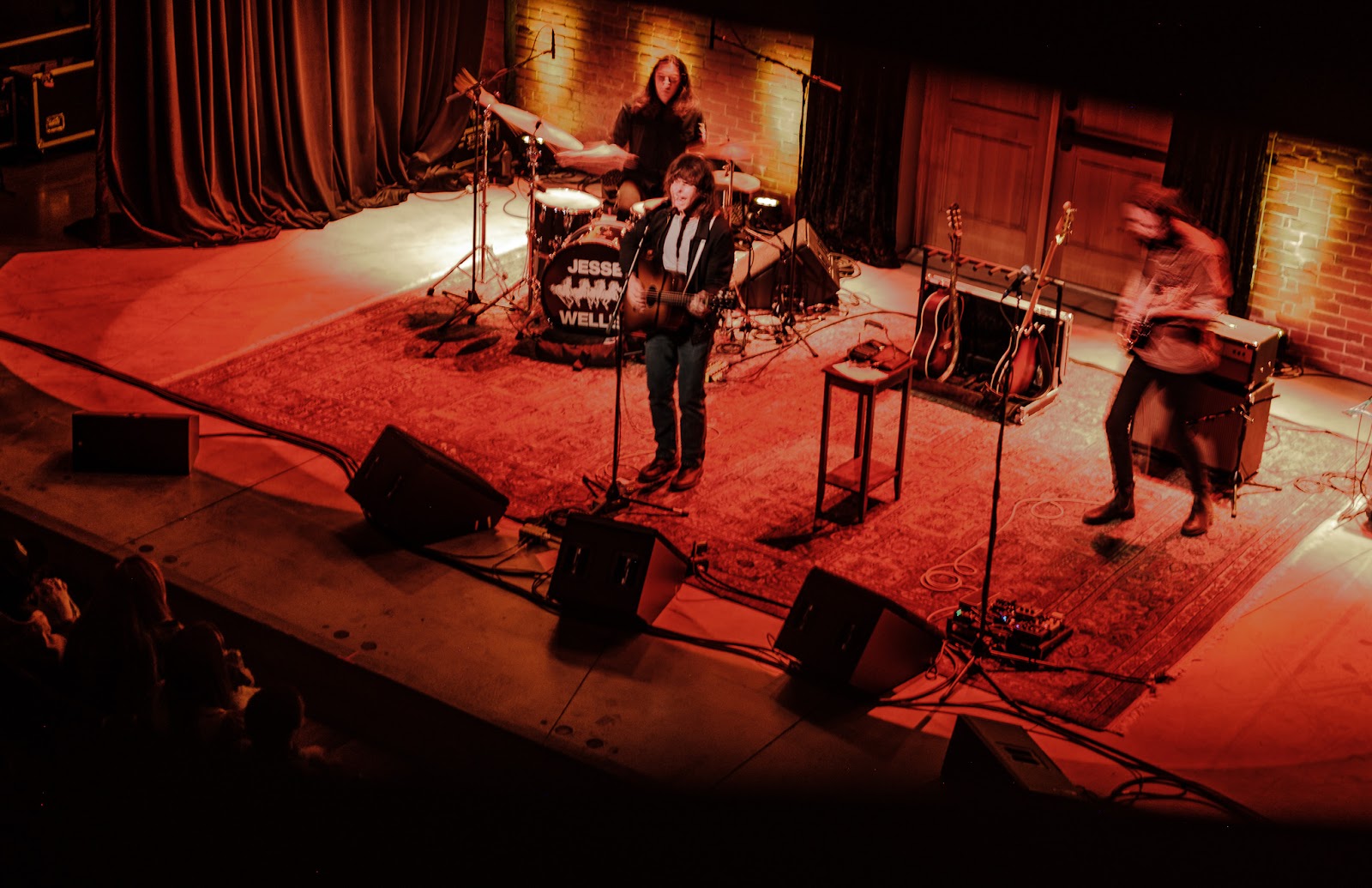
Jesse Welles plays a cover of “Heart Shaped Box” alongside drummer Connor Streeter and bassist Joel Parks during the Fear is the Mind Killer tour in Fort Collins, Co., Saturday, Apr. 5, 2025. (Radio 1190/Payton Cordova)
The cynic will speculate that Welles saw the success of Oliver Anthony’s recording of “Rich Men North of Richmond” as a future example for himself. Soon after this viral performance, Anthony shrank from the spotlight after stating his political views, making himself a lukewarm pariah to extreme conservatives and progressives alike. In this time, Welles’ started to find a cultural absence that he may–after years and numerous attempts at making a life as a musician–finally have the words to fill.
His writing is at its most shallow when it critiques headline news with a generic voice, his own experience safely hidden from his words. But while some of his earlier songs from 2024 suffer from this shallowness, his recent work has grown more capable and assured at a rapid pace. At his most provocative he writes as the voice of the powerful, weaponizing Trump quotes in his recent songs “Red” and “Tarrific.” But Welles is at his best when he intertwines his life story with widely-shared frustrations in his tunes “Let It Be Me” and “The Poor.” His words tell his audience that he–or the character he speaks for–has been challenged in life, but right now, they can all sing together.
At the close of the performance, Streeter consoled Welles’ sloping shoulders with a pat on the back. No longer concerned with the staff, the audience got to their feet, urging Welles into an encore for which they would stay standing. “It’s good to see y’all,” he cracked as he came back onstage.
Sunday Night
Even by its own standards, the Fox Theatre was packed. At silences between songs in the pre-show fans cheered, willing the musician to come onto stage before call time. The stage clocks flipped to 8:29 and 8:31, revealing Welles at the mic, blond hair rouged under pink show lights. He stuffed a harmonica in his back pocket and plugged his guitar into the amp. Booze flowed from the bar and Welles was playing with a new life after Saturday’s tired performance.

The audience of the Fox Theater waits for showtime during Jesse Welles’ Fear is the Mind Killer tour in Boulder, Co., Sunday, Apr. 6, 2025. (Radio 1190/Payton Cordova)
Tonight of all the nights, Welles would be the most vocal. “I’m going to do my best to leave my voice in Boulder,” he said late in the show, crows feet dancing by his eyes. “We got a couple days off after this, so I can sing, sing, sing.” The crowd hollered and the band played on.
After the show, Welles’ touring videographer set up cameras and a couple of microphones at the bar in the lobby. The musician came out soon after, all but invisible to the crowd gathered to buy his merch. He raised himself onto the bar and began to field requests from a slowly gathering congregation. His voice had lost resolution and scraped our ears like a cat’s tongue, but he pushed on. When someone in the crowd asked him to play “I Ain’t Got None of My Friends Left,” a tune penned about the loss which comes with rapid change, his words were fighting to come out. “The river’s deep, the river’s wide—And there ain’t no way across it—‘Cept to swim or sink and die”
He took off his harmonica holder and said, “You got my voice;” leaving the bar with a laugh.
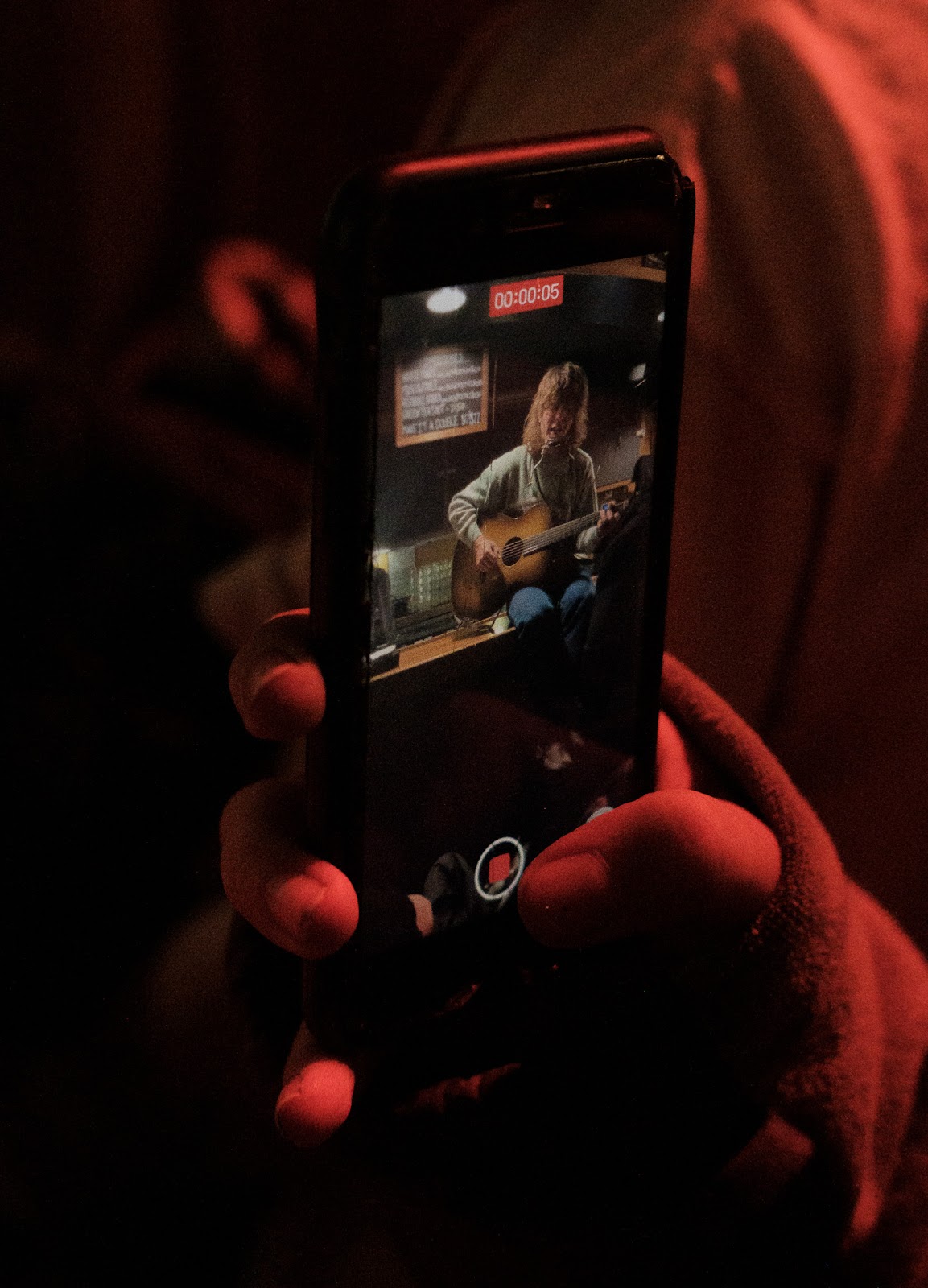
A young audience member records Jesse Welles performing after his concert at the Fox Theater in Boulder, Co., Sunday, Apr. 6, 2025. (Radio 1190/Payton Cordova)
